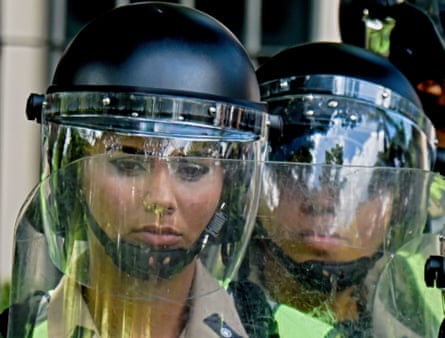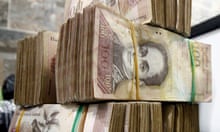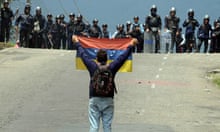Caracas is braced for a day of protests against President Nicolás Maduro’s government, with soldiers and armoured cars patrolling the capital in the run-up to Thursday’s march.
The country has been tense amid a crackdown on opposition figures, but some are hopeful that the protest could herald a new stage in Venezuela’s political showdown.
Organisers of the protest, a coalition known as MUD, hope to draw hundreds of thousands of marchers from across the country of 30 million to what is being called the “Takeover of Caracas”, where they will demand a recall referendum before the end of the year, which would cut Maduro’s term short and trigger new elections.
The protests will test the strength of the opposition’s determination to oust the president and measure how far the government is willing to go to stay in power in the oil-rich state, which has been crippled by severe shortages of basic goods and medicines, rampant crime and surging inflation.
The government said what was being planned for 1 September was a “coup” by “the anti-democratic opposition and international right”, according to the foreign ministry.
Though the opposition does want to remove Maduro from power, it has said it will adhere to constitutional democratic means, and insists the protest will be peaceful.

But the fear of a crackdown is not unfounded. The sharp repression that followed weeks of protest in 2014 left 43 people dead. Several opposition figures were later prosecuted for their alleged role in inciting violence and Leopoldo López, the leader of what is considered a radical faction of the opposition, was sentenced to 17 years in prison by what human rights activists said was a kangaroo court.
Since then, and despite the increasingly critical food shortages, protests against the government have been muted. But Thursday could mark the beginning of a new stage in the political showdown, say analysts.
“This is a real turning point,” said David Smilde, a Venezuela expert at the Washington Office for Latin America. “This will determine what the opposition’s strategy is and what the government strategy looks like.”
So far the government’s strategy has been to preventatively crack down on the opposition, jailing several leaders on charges they were planning acts of violence during the protest. It has deployed soldiers on the streets of Caracas and began blocking some access to the capital last week. The government has also banned private aircraft and drones from flying over Venezuelan territory until 5 September. Opposition leaders said they would defy the rule and fly drones over the march.

Since taking office in 2013, Maduro has relied heavily on the military for support, promoting high-ranking officers to key positions in his government. To tackle the food shortage, last month Maduro appointed Venezuela’s top general, defence minister Vladimir Padrino López, to oversee the “grand mission of sovereign supply”, which aims to secure the supply of basic goods. Last week Padrino named one general for each of the most crucial goods.
“The gradual expansion of military powers in response to the regime’s loss of legitimacy is starting to resemble a slow-motion coup,” wrote Phil Gunson, analyst for the International Crisis Group thinktank.
Smilde said Maduro’s decision to involve generals in government was like “becoming blood-brothers with the military”. “Maduro has made the military a stakeholder in the government so when things go bad, it’s not that people will be rebelling against the government, they will be rebelling against the military, too,” he said.
However, Venezuela is under increasing international pressure and scrutiny. Last month, the US filed trafficking charges against the former head of the Venezuelan drugs agency, whom Maduro then promptly named interior minister. At the same time regional groups such as the Organisation of American States, and the Mercosur trading block have questioned the Venezuelan government’s democratic credentials.

“Since they know the world is watching, the military should respect the manifestation of the people and understand they want change,” says Luis Alberto Buttó, director of the Latin American Centre for Security Studies at the Simón Bolívar University in Caracas.
Maduro took office after narrowly winning an election to succeed the controversial and charismatic Hugo Chávez, who set his country on the path toward “21st-century socialism” with enormous popular support. Under Maduro, however, Venezuela has sunk into an ever-deepening economic and social crisis.
Many Venezuelans complain they are eating only once or twice a day amid chronic food shortages. Even standing in long queues for hours to enter supermarkets does not assure shoppers they will go home with anything. Medicines for life-threatening conditions are nearly impossible to come by. The economy is expected to contract by 8% this year after the GDP dropped 5.7% in 2015. Inflation hovers around 700% and violent crime is skyrocketing.
A poll by Venebarómetro found that 88% of “likely” voters in a recall referendum would choose to oust Maduro.

While the 1 September marches will be a show of force for the opposition, the protest is unlikely to sway electoral authorities – widely considered to do the government’s bidding – to move towards a recall referendum this year.
And timing is key. The opposition managed to collect enough signatures earlier this year to set in motion a series of steps to force a recall vote. They are now waiting for election authorities to set a definitive date to launch a second drive to get 3.9 million people – 20% of registered voters – to sign the recall petition in three days to formally trigger the referendum. Officials said the date would be at the end of October.
That, according to the opposition, would give officials enough time to organise the referendum on Maduro before he reaches the mid-point of his six-year term on 10 January 2017. A recall before that date would mean new elections. After that, his vice-president would simply take over and most likely continue the policies that critics say have brought the country to its knees.










Comments (…)
Sign in or create your Guardian account to join the discussion